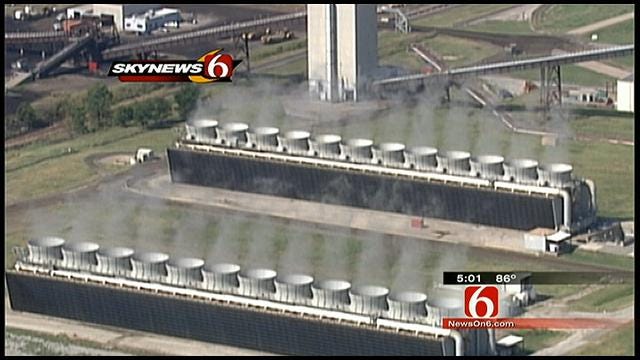Oklahoma, EPA And PSO End Dispute Over Oologah Power Plant
The State of Oklahoma has reached an agreement with PSO and the EPA that settles compliance challenges with federal air quality rules relating to PSO's two coal-fired power plants in Oologah.Tuesday, April 24th 2012, 11:38 am
The State of Oklahoma has reached an agreement with Public Service Company of Oklahoma and the Environmental Protection Agency that settles compliance challenges with federal air quality rules relating to PSO's two coal-fired power plants in Oologah.
In May 2011, the Attorney General's Office filed a lawsuit against the EPA to allow more time for Oklahoma stakeholders to craft a state solution.
3/8/2012 Related Story: PSO: EPA Proposal Could Raise Customers' Fees By 12 Percent
In a news release on Tuesday, Governor Mary Fallin says the agreement permits PSO to comply with EPA rules, including the Regional Haze Rule and the Mercury and Air Toxics Rule, while simultaneously protecting Oklahoma consumers and ratepayers.
PSO's BudGround says it's a good agreement where PSO can continue to meet new federalair quality guidelines that are becoming more stringent.
"We'vebeen negotiating for about a year to come to a conclusion for what is a betterway to reduce emissions for Oklahoma, that's good for our customers, that'sgood for our company. And it's good forOklahoma," Ground said.
Under the terms of the settlement, PSO agrees to meet specified emission rates at both coal units at PSO's Northeastern Plant in Oologah, retire one unit in 2017, install certain emissions control equipment on one Northeastern unit in 2015 and retire the second unit in 2025 or 2026.
"Ithas to be gradual because of the money involved, and the time for engineering,procurement and construction of equipment," Ground said.
The EPA says the agreement is a win-win for both Oklahoma and the federal government.
"By working together, Oklahoma, PSO and EPA have developed a practical plan which meets both our shared environmental goals and Oklahoma's energy needs for the future. When completed, this plan will help PSO expand its use of natural gas and other renewable sources of power. Oklahoma has lead the way in creating a win-win solution for us all," said Al Armendariz, EPA Regional Administrator.
The plantuses about 3-million tons of coal each year. That's five, 110 car trains fullof coal each week. Under the agreement, PSO would likely use more natural gasto generate electricity instead.
A moregradual shift away from coal would avoid a significant and more immediate pricejump on all of our electrical bills.
But sincecoal is much cheaper to use, PSO estimates our bills will go up about 10percent, but that will happen gradually over a longer time span as coal use isphased out.
The settlement agreement is still subject to public review by the Oklahoma Corporation Commission.
More Like This
April 24th, 2012
September 29th, 2024
September 17th, 2024
Top Headlines
December 15th, 2024
December 15th, 2024
December 14th, 2024











